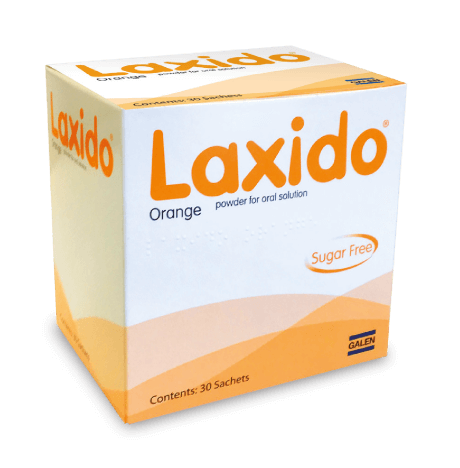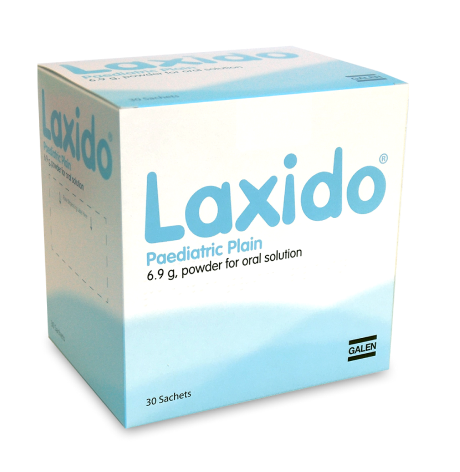
Safety Information
Safety Information on the Laxido product range
The information on this page is intended for UK healthcare professionals only.
This webpage is intended for UK healthcare professionals only
Some information regarding contraindications, special warnings and undesirable effects are listed below. For further details, please refer to the respective product SPCs.
Laxido Orange is contraindicated in intestinal obstruction or perforation caused by functional or structural disorder of the gut wall, ileus and in patients with severe inflammatory conditions of the intestinal tract (e.g. ulcerative colitis, Crohn’s disease and toxic megacolon).
Hypersensitivity to the active substances or to any of the excipients listed in section 6.1 of the SPC.
The fluid content of Laxido Orange when re-constituted with water does not replace regular fluid intake and adequate fluid intake must be maintained.
The faecal impaction diagnosis should be confirmed by appropriate physical or radiological examination of the rectum and abdomen.
Mild adverse drug reactions are possible as indicated in section 4.8 of the SPC. If patients develop any symptoms indicating shifts of fluids/electrolytes (e.g. oedema, shortness of breath, increasing fatigue, dehydration, cardiac failure) Laxido Orange should be stopped immediately and electrolytes measured and any abnormality should be treated appropriately.
The absorption of other medicinal products could transiently be reduced due to an increase in gastro-intestinal transit rate induced by Laxido Orange (see SPC section 4.5).
This medicinal product contains 187mg of sodium per sachet, equivalent to approximately 9% of the WHO recommended maximum daily intake of 2g sodium for an adult. When used to treat chronic constipation the maximum daily dose of this product is equivalent to approximately 28% of the WHO recommended maximum daily intake for sodium.
Laxido Orange is considered high in sodium. This should be particularly taken into account for those on a low salt diet.
In patients with swallowing problems, who need the addition of a thickener to solutions to enhance an appropriate intake, interactions should be considered, see SPC section 4.5.
Reactions related to the gastrointestinal tract occur most commonly.
These reactions may occur as a consequence of expansion of the contents of the gastrointestinal tract, and an increase in motility due to the pharmacologic effects of Laxido Orange. Mild diarrhoea usually responds to dose reduction.
The frequency of the adverse effects is not known as it cannot be estimated from the available data.
A comprehensive list of undesirable effects can be found via the SPC – click here or via the Prescribing Information link below.

Hypersensitivity to the active substances.
Laxido Paediatric Plain is contraindicated in intestinal obstruction or perforation caused by functional or structural disorder of the gut wall, ileus and in patients with severe inflammatory conditions of the intestinal tract (e.g. ulcerative colitis, Crohn’s disease and toxic megacolon).
The fluid content of Laxido Paediatric Plain when re-constituted with water does not replace regular fluid intake and adequate fluid intake must be maintained.
The faecal impaction diagnosis should be confirmed by appropriate physical or radiological examination of the rectum and abdomen.
Mild adverse drug reactions are possible as indicated in Section 4.8 of the SPC. Rarely symptoms indicating shifts of fluid/electrolytes e.g. oedema, shortness of breath, increasing fatigue, dehydration and cardiac failure have been reported in adults when using preparations containing macrogol. If this occurs Laxido Paediatric Plain should be stopped immediately, electrolytes measured, and any abnormality should be treated appropriately.
When used in high doses to treat faecal impaction this medicinal product should be administered with caution to patients with impaired gag reflex, reflux oesophagitis or diminished levels of consciousness.
Laxido Paediatric Plain solution when reconstituted has no calorific value.
The absorption of other medicinal products could transiently be reduced due to an increase in gastro-intestinal transit rate induced by Laxido Paediatric Plain (see SPC section 4.5).
This medicinal product contains 93 mg of sodium per sachet, equivalent to approximately 4.6% of the WHO recommended maximum daily intake of 2 g sodium for an adult.
In patients with swallowing problems, who need the addition of a thickener to solutions to enhance an appropriate intake, interactions should be considered, see SPC section 4.5.
Reactions related to the gastro-intestinal tract occur most commonly.
These reactions may occur as a consequence of expansion of the contents of the gastro-intestinal tract, and an increase in motility due to the pharmacological effects of Laxido Paediatric Plain.
In the treatment of chronic constipation, diarrhoea or loose stools normally respond to a reduction in dose.
Diarrhoea, abdominal distension, anorectal discomfort and mild vomiting are more often observed during the treatment for faecal impaction. Vomiting may be resolved if the dose is reduced or delayed.
A comprehensive list of undesirable effects can be found via the SPC – click here or via the Prescribing Information link below.

Adverse events should be reported. Reporting forms and information can be found at www.mhra.gov.uk/yellowcard. Adverse events should also be reported to Galen Limited on 028 3833 4974 and select the customer services option, or e-mail customer.services@galen-pharma.com. Medical information enquiries should also be directed to Galen Limited.
Galen Ltd does not take any responsibility for content hosted on external websites.
Click to proceed